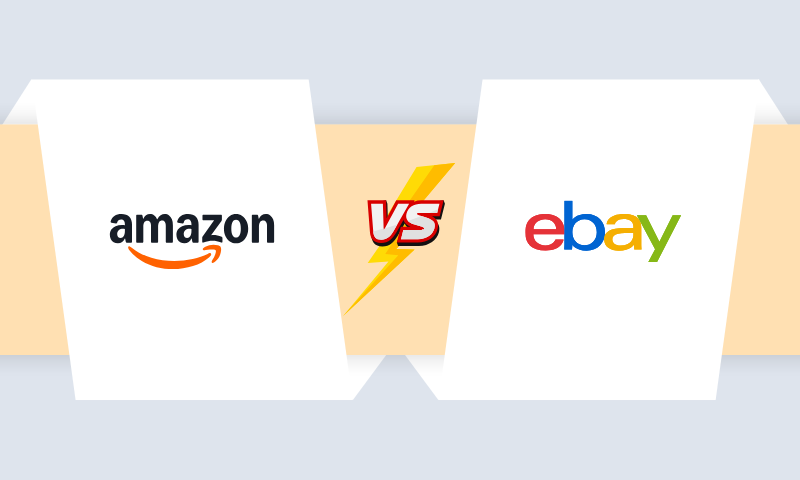
Selling on Amazon vs eBay: Who Would Win?
When it comes to online marketplaces, Amazon and eBay are two of the biggest players in the game. Each platform offers unique opportunities and challenges for sellers, and choosing the right one depends on your products, strategy, and business model. This guide will help you compare Amazon and eBay across various dimensions so you can make an informed decision.
eBay vs Amazon: What’s the Difference?
Amazon is a centralized retail marketplace where consistency, fulfillment, and customer service are tightly controlled. eBay, on the other hand, functions more like an auction house and open market, offering greater flexibility in listings and pricing.
Amazon allows sellers to either ship products themselves or use Fulfillment by Amazon (FBA), which handles logistics, customer service, and returns. eBay sellers handle all fulfillment themselves unless they integrate third-party logistics.
Is Amazon More Competitive For Sellers?
Amazon’s marketplace is extremely competitive due to the presence of established sellers, brands, and Amazon’s own private label products. Product pages are standardized, and sellers often compete solely on price, shipping speed, and reviews. Success on Amazon often requires significant investments in SEO, advertising, and fulfillment.
eBay provides more room for differentiation. Sellers can craft their own product pages, set unique pricing strategies, and use promotional tools to stand out. While competition exists, the structure of eBay allows for more creative control and branding.
Are Buyers Loyal to eBay or Amazon, or Do They Buy From Both?
Amazon has cultivated a massive base of loyal customers, particularly through its Prime membership, which offers free two-day shipping and exclusive deals. Buyers tend to prefer Amazon for convenience, speed, and reliability.
eBay has a niche audience that values unique items, collectibles, and bargains. Many buyers use both platforms, but their behavior differs depending on the type of product they are looking for. Casual shoppers often turn to Amazon, while enthusiasts and resellers may favor eBay.
Can You Make More Money Selling on eBay or Amazon?
Profitability depends on what you’re selling. High-volume, branded, and commodity items tend to perform better on Amazon due to its massive reach. However, Amazon’s fees, including FBA and referral fees, can eat into margins.
On eBay, sellers may enjoy lower fees and better margins, especially on used or unique products. However, they might sacrifice sales volume. For entrepreneurs with one-of-a-kind items or custom goods, eBay can often be more profitable per sale.
What Can I Sell On eBay and Amazon?
Amazon has strict guidelines on what can be sold, especially in gated categories like health, beauty, and electronics. Sellers may need approval, invoices, and certifications.
eBay is more relaxed in terms of categories and listing requirements. This makes it ideal for sellers of used, refurbished, or niche products. However, certain restricted items still apply on both platforms.
Which is Easier to Sell On — eBay vs Amazon?
Amazon’s setup process for sellers can be more involved due to its regulatory requirements and compliance. However, once set up, the system is streamlined for scaling via FBA.
eBay offers a quicker and simpler listing process, especially for casual or part-time sellers. Creating customized listings, uploading images, and starting to sell can often be done in a matter of minutes.
Do Buyers Trust eBay or Amazon Sellers More?
Amazon’s buyer protection policies and uniform product pages give buyers a high level of trust and confidence. Reviews and ratings are standardized, and Amazon often steps in to resolve disputes.
eBay’s feedback system offers transparency, but some buyers may perceive the platform as less consistent, especially for high-ticket items. Nonetheless, eBay has strong buyer protection policies in place and has improved its reputation in recent years.
The Pros and Cons of Selling on eBay
Pros:
- Flexible listing formats (auctions and fixed price)
- Lower selling fees in many categories
- Ideal for used and unique items
- Easier listing and startup process
Cons:
- Limited scalability
- Manual fulfillment and customer service
- Potential for lower visibility without promotions
The Pros and Cons of Selling on Amazon
Pros:
- Access to millions of loyal customers
- Fulfillment by Amazon (FBA) reduces logistics burden
- Prime delivery increases buyer conversion
- Strong brand reputation
Cons:
- High competition, including Amazon’s private label products
- Higher fees (referral + FBA + storage)
- Strict policies and possible account suspensions
Who Wins – eBay or Amazon?
There is no universal winner between Amazon and eBay — it depends on your business model. If you’re selling new, high-volume, or branded products and can scale, Amazon may be the better platform. If you have unique, used, or collectible items and want more control over listings and branding, eBay could be your best bet.
Many sellers find success by operating on both platforms, taking advantage of the distinct strengths of each. Consider starting with one platform and expanding as you learn your audience and product-market fit.


